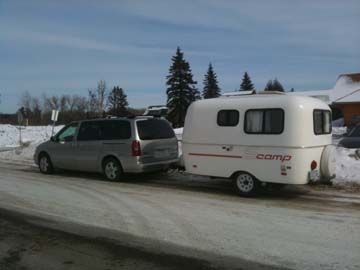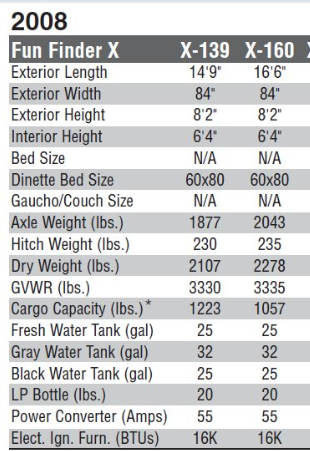My future plan is that eventually, when my dad is gone and we sell the house, I want to take up to a year and explore the country. After that, I will decide where I want to settle down (and it won't be in Minnesota!), and take shorter trips after that.
I am going back and forth on deciding if I should pull a smaller travel trailer with my Jeep Liberty (can pull up to 5000 lbs), or if I should get a Class C and pull my Jeep. I would like to know what you all consider the pros and cons of both ways, in case there are things that I haven't thought of (I am sure there are many!), due to not having done this before. I am wondering about convenience, cost of maintenance and insurance, ease of travel and hooking up/unhooking, having pets along, etc.
And could I tow my Jeep Liberty with a 24-26 ft Class C?
My future plans...another question...
33 posts
• Page 1 of 3 • 1, 2, 3
My future plans...another question...
Last edited by BarbaraRose on Sat Nov 16, 2013 10:55 pm, edited 1 time in total.
Barbie, Romeow, and Sophie, missing Lola! (and lots of ferrets running around in my heart!)

"Until one has loved an animal, a part of one's soul remains unawakened"
-Anatole France

"Until one has loved an animal, a part of one's soul remains unawakened"
-Anatole France
-

BarbaraRose - Posts: 11417
- Joined: Sun Dec 06, 2009 8:23 pm
- Location: Indio, CA
Re: My future plans...
I can only share what I've learned with my experience. I first started all of "this" because I loved roaming and visiting new places so I bought my C. I now have a fifth wheel and am living in one spot. As much as I love my new rig and working at this campground, I really, really miss traveling with my rig. I would love nothing more than to work and travel around the country right now. So, from my limited knowledge, I think you'd probably prefer the C and towing the Jeep.
Amy and Bobby


-

Ladyhawk - Posts: 380
- Joined: Sat Jan 02, 2010 1:38 pm
- Location: Colorado
Re: My future plans...
Pros and cons for both. I've done both. When we were doing a lot of moving around, we decided having two engines (motorhome towing car) was a good choice in case we ran into mechanical trouble. And we did have that happen 3 or 4 times. We were able to leave the rig at the repair shop and take off in the car to shop, sightsee, visit friends in the area, etc. Same would hold true if the problem was with the car - could take motorhome to closest RV park and be comfortable, etc. Some, but not all, repair facilities will let you sleep in your camper on their property, but you have to decide if you're comfortable with that. We have also done that a time or two. We decided our way of travel was to settle into a centrally located RV park for a few days or a week and use the car to sightsee the area. We could get into places where the motorhome (or a vehicle & trailer) couldn't go and got much better mileage doing it. To each his own, but the way we traveled, having 2 motors worked for us. When we had a tow vehicle and trailer it was a tad harder to unhook and set up if we were only stopping for one night while on the road.
Down side: you have two motors to break down and two fuel tanks to fill and the cost is much greater. You need to figure out how you intend to travel and what would work best for you. Since you didn't ask - my advice would be to start off with the cheaper choice. Get a trailer to be towed with the Liberty and try it for awhile to see how you like it. You can always change your option later.
Evie
Down side: you have two motors to break down and two fuel tanks to fill and the cost is much greater. You need to figure out how you intend to travel and what would work best for you. Since you didn't ask - my advice would be to start off with the cheaper choice. Get a trailer to be towed with the Liberty and try it for awhile to see how you like it. You can always change your option later.
Evie
Evie
Southern California
Southern California
- Pooker
- Posts: 1346
- Joined: Sun Dec 28, 2008 10:55 am
Re: My future plans...
BarbaraRose wrote:I am going back and forth on deciding if I should pull a smaller travel trailer with my Jeep Liberty (can pull up to 5000 lbs), or if I should get a Class C and pull my Jeep.
I'd look again at what you can safely tow with a Jeep Liberty. Rule of thumb is to tow 80% of what your vehicle is capable of. Also, the wheel base is pretty short on a Liberty. You sure don't want to get into a tail-wagging-the-dog situation. I'd be afraid to get anything longer than 16' or with a "wet weight" of more than 3500#. Liberties are nice little jeeps, with the operative word being "little".
Here are a couple of posts from an RV forum talking about a 2013 Liberty …
I'm a car rental manager for a living, and I drive new Libertys on a regular basis. Anything over 3000 lbs would make me nervous, and I'm an old hand at doing this. If they are rated for 5K, I can't understand how. I would stick with a pop up using a Liberty, and even then would watch the weights carefully.
Gross Combined Weight Rating minus weight of vehicle, fuel, passengers, pets, luggage, and anything else you carry is what you can safely tow. Discount 10% off GVWR if you tow in the mountain west.
And another one ..
When a car manufacturer says a vehicle can tow 5000 lbs, they mean it can move the load and won't damage the vehicle in the short term (towing always increases wear & tear in the long term). They don't mean you will enjoy it, nor do they promise comfort or reasonable performance under all driving conditions … All that said, 5000 lbs is 5000 lbs. You need to subtract from that any extra weight carried in the Liberty (passengers and gear), as well as the weight of the hitch itself. Let's say that leaves 4600 lbs for the loaded weight of the trailer. To me, that's still too much for a short wheel base, light suspension tow vehicle and I would prefer to hold it under 4000 lbs. And even at that, I would still expect it to struggle on hills.
So, bottom line: Just because the manufacturer says you can doesn't necessarily mean you should.
Laura
-

Azusateach - Posts: 526
- Joined: Wed Dec 12, 2012 11:56 pm
Re: My future plans...
I agree with Laura. Several friends have Liberty's and they're not a heck of a lot bigger than my Tracer wagon. I can't imagine them towing much more than a small light weight pop-up safely.
My mind works like lightning...one brilliant flash and it's gone.
- dpf
- Posts: 1939
- Joined: Mon Jul 21, 2008 5:15 pm
- Location: SE SD
Re: My future plans...
I agree with Laura.
I have a Trailblazer (about the size of a Jeep) that I tow my 13 ft. Scamp with. The book says I can pull 5800 lbs. Chatting with everyone on these sites, I shouldn't try pulling anything larger than a 16 ft. One forgets about all the extra weight we put in the TV and the Camper. We might be able to tow that much weight, but when I had the van, it really bogged down up any hills. That's why I got rid of the van and got the Trailblazer with a little bigger engine and more torque. I'm still tossing around if I want a MH or keep the Scamp. I like the idea of only having to buy tires, insurance and all other maintenance on one verses two. I love my Scamp and it's easy for me to handle alone.
I have a Trailblazer (about the size of a Jeep) that I tow my 13 ft. Scamp with. The book says I can pull 5800 lbs. Chatting with everyone on these sites, I shouldn't try pulling anything larger than a 16 ft. One forgets about all the extra weight we put in the TV and the Camper. We might be able to tow that much weight, but when I had the van, it really bogged down up any hills. That's why I got rid of the van and got the Trailblazer with a little bigger engine and more torque. I'm still tossing around if I want a MH or keep the Scamp. I like the idea of only having to buy tires, insurance and all other maintenance on one verses two. I love my Scamp and it's easy for me to handle alone.
- mnladyus
- Posts: 79
- Joined: Thu Jun 20, 2013 10:07 am
- Location: Minnesota
Re: My future plans...
I have a 2012 Jeep Liberty and tow a small, lightweight trailer. The GVWR or "wet weight" as someone called it is 3850 lbs. Towing capacity for the Liberty is 3500 without a weight distribution hitch and 5000 with one. When I went to the scales with the trailer loaded for a week of camping the trailer weighed 3000 lbs. I will always use the 80% rule and I am well below that. I have a weight distribution hitch. I don't have any issues towing my trailer. I wouldn't tow anything longer with the Liberty due to the short wheelbase. The "box" of my trailer measures 16' even though it is marketed as an 18'. Pop-ups are actually quite heavy although they might tow better due to the low profile.
Don't ask yourself if you can tow it, ask yourself if you can stop it.
This is my 4th rv (3 trailers and a B+ motorhome) so I have a little experience towing and knew what the limits were when I purchased the Liberty. I am comfortable with my set up and am not worried about the abilities of the Jeep. I go up the hills just like the big diesel motorhomes. Slow and steady. Downhill is the same slow and steady pace.
Using the Jeep as a toad is a great option but the cost of getting it set up with base plates, tow bar, braking system, etc can run well over $2,000 with parts and labor. If you can do the install yourself, you will save a little. I am pretty handy and could do it myself but I wouldn't, I would pay someone.
I would try a small, lightweight trailer like the Scamp, etc and see how it goes to start with. Maybe find a driving school in your area. I wish I would've done that when I started years ago. Do all the research yourself. Look at the GVWR of the trailers, not the dry weight. And like someone said, the shorter the trailer the better. Dealers will tell you anything to get you to buy their trailer although I was going to test-tow a trailer when I was looking and made an appt to come in. They were going to set it up with a weight distribution hitch and everything. When I got there, they decided the Liberty couldn't handle it. I had to respect them (even though i knew they were wrong) for not just saying anything to sell me the trailer. There are a few honest dealers out there.
There is a lot of information on the Internet for older trailers including weights, etc.
Good luck in your search!
Laura
Don't ask yourself if you can tow it, ask yourself if you can stop it.
This is my 4th rv (3 trailers and a B+ motorhome) so I have a little experience towing and knew what the limits were when I purchased the Liberty. I am comfortable with my set up and am not worried about the abilities of the Jeep. I go up the hills just like the big diesel motorhomes. Slow and steady. Downhill is the same slow and steady pace.
Using the Jeep as a toad is a great option but the cost of getting it set up with base plates, tow bar, braking system, etc can run well over $2,000 with parts and labor. If you can do the install yourself, you will save a little. I am pretty handy and could do it myself but I wouldn't, I would pay someone.
I would try a small, lightweight trailer like the Scamp, etc and see how it goes to start with. Maybe find a driving school in your area. I wish I would've done that when I started years ago. Do all the research yourself. Look at the GVWR of the trailers, not the dry weight. And like someone said, the shorter the trailer the better. Dealers will tell you anything to get you to buy their trailer although I was going to test-tow a trailer when I was looking and made an appt to come in. They were going to set it up with a weight distribution hitch and everything. When I got there, they decided the Liberty couldn't handle it. I had to respect them (even though i knew they were wrong) for not just saying anything to sell me the trailer. There are a few honest dealers out there.
There is a lot of information on the Internet for older trailers including weights, etc.
Good luck in your search!
Laura
- Cougarfan
- Posts: 394
- Joined: Sun Jul 20, 2008 10:51 am
- Location: NW Oregon
Re: My future plans...
..
Glad we're talking about weight...I find it all very confusing.
My 16' Fun Finder:
DRY WEIGHT - 2,278#
CARGO CAPACITY** - 1,057
GVWR = 3,335 (above numbers added together)
The spec sheet footnote ** = Cargo capacity does not include weight of water or LP gas
So, based on the footnote, if I have a full tank of water (25 gal), I need to subtract 200# from the CARGO CAPACITY, and also subtract the total weight of both full propane tanks??
What does AXLE WEIGHT - 2,043# mean? Is that the max amount that EACH axle can carry?
..
Glad we're talking about weight...I find it all very confusing.
My 16' Fun Finder:
DRY WEIGHT - 2,278#
CARGO CAPACITY** - 1,057
GVWR = 3,335 (above numbers added together)
The spec sheet footnote ** = Cargo capacity does not include weight of water or LP gas
So, based on the footnote, if I have a full tank of water (25 gal), I need to subtract 200# from the CARGO CAPACITY, and also subtract the total weight of both full propane tanks??
What does AXLE WEIGHT - 2,043# mean? Is that the max amount that EACH axle can carry?
..
- mitch5252
- Posts: 9229
- Joined: Fri Mar 13, 2009 5:47 pm
- Location: NW TN
Re: My future plans...
Don't ask yourself if you can tow it, ask yourself if you can stop it.
Thank you, Laura!! I wish more people would pay attention to that simple statement!!!!
Thank you, Laura!! I wish more people would pay attention to that simple statement!!!!
Only Irish coffee provides in a single glass all four essential food groups: alcohol, caffeine, sugar and fat.
- Alex Levine
<><>
- Alex Levine
<><>
-

sharon - Posts: 4386
- Joined: Wed Dec 24, 2008 8:04 pm
- Location: SoCal
Re: My future plans...
mitch5252 wrote:..
Glad we're talking about weight...I find it all very confusing.
My 16' Fun Finder:
DRY WEIGHT - 2,278#
CARGO CAPACITY** - 1,057
GVWR = 3,335 (above numbers added together)
The spec sheet footnote ** = Cargo capacity does not include weight of water or LP gas
So, based on the footnote, if I have a full tank of water (25 gal), I need to subtract 200# from the CARGO CAPACITY, and also subtract the total weight of both full propane tanks??
What does AXLE WEIGHT - 2,043# mean? Is that the max amount that EACH axle can carry?
..
Mitch, you're right on subtracting the weight of the water AND the weight of the propane. Another thing that is sometimes not included is the weight of the batteries on the tongue. If you've got 2, then you need to take that into account. All of this is important when you're thinking about how much weight you're putting on your hitch. And you also need to think about what you're putting in the truck. That counts as part of what you can tow, also.
As far as axel weight goes, I think you're correct there also. I'm hoping that Donna(?), our fifth wheel gal who's also a big rig driver, will weigh in on this. She makes it all quite understandable.
Laura
-

Azusateach - Posts: 526
- Joined: Wed Dec 12, 2012 11:56 pm
Re: My future plans...
..
The tow capacity of my 4x4 truck is 6,100 lbs.
So, I think I'm good to go in the overall weight department.
If I get close, I can just leave Abby at home with lots of food and water.
I just worry about the axles on the trailer since I'm being more "free" with adding stuff with the new truck.
The van kept me cautious!
Yes, Vickie, I need to have something to worry about.
That's my personality (thanks a lot, Dad)
My main worry lately, though, is is you're going to kill me with your cooking...
..
The tow capacity of my 4x4 truck is 6,100 lbs.
So, I think I'm good to go in the overall weight department.
If I get close, I can just leave Abby at home with lots of food and water.
I just worry about the axles on the trailer since I'm being more "free" with adding stuff with the new truck.
The van kept me cautious!
Yes, Vickie, I need to have something to worry about.
That's my personality (thanks a lot, Dad)
My main worry lately, though, is is you're going to kill me with your cooking...
..
- mitch5252
- Posts: 9229
- Joined: Fri Mar 13, 2009 5:47 pm
- Location: NW TN
Re: My future plans...
mitch5252 wrote:..
Glad we're talking about weight...I find it all very confusing.
My 16' Fun Finder:
DRY WEIGHT - 2,278#
CARGO CAPACITY** - 1,057
GVWR = 3,335 (above numbers added together)
The spec sheet footnote ** = Cargo capacity does not include weight of water or LP gas
So, based on the footnote, if I have a full tank of water (25 gal), I need to subtract 200# from the CARGO CAPACITY, and also subtract the total weight of both full propane tanks??
What does AXLE WEIGHT - 2,043# mean? Is that the max amount that EACH axle can carry?
..
IF you are talking about your rig pictured in your blog, something is off. The camper only has 1 axle in the picture. If its GVWR is 3,335# it should have at least a 3,000# axle.
Example 3,3335# GVWR (max the trailer is allowed to weight) minus the 333# hitch weight (normally around 10% in a TT) means you should have a 3,000# axle min. 2,043# sounds like a tire load rating and two tires would equal 4,086# of load capacity.
Example: on my 5'r I am rated for 14,000# GCWR (actually 14,465# or something but I just call it 14,000#) and I have two 6,000# axles for 12,000# and a pin or hitch weight of 2,800# (5th wheels average around 20-25% pin/tong weight. I tend to average 22%, but we'll call it 20% for easy math). So 14,000# - 2,800# = 11,200# on axles.
The STOP is the most important part. While trailers are required to have brakes (if they are over 3,000# weight, varies by state ) its awesome if the tow vehicle can still stop it by itself. On my trip to CT this summer the power cord to the trailer bounced loose and I had to stop with just the truck brakes. A zip tie kept the cord plugged in after than but stopping without trailer brakes was not fun.
- MelissaD
- Posts: 1382
- Joined: Sun May 19, 2013 9:26 pm
- Location: Fort Wayne, IN
Re: My future plans...
I haven't had a year of wandering yet, but here's my two cents worth anyway. 
I'd go with the smallest, lightest trailer available, as long as you're comfortable inside. The fiberglass trailers are probably the lightest weight. I've seen reports of dry weight under 1000 pounds for some of the older ones.
Why? Lower initial investment and lower driving/maintenance costs, so more money left to buy a home base or to travel further. Also, if you do settle somewhere, a small trailer might be easier to store -- and again, cheaper to take out for the random adventure.
I'd love to get my hands on one of those little UHaul trailers that were produced for about three years in the early '80s. Light weight, great design, solid construction -- I've seen several that are still sound with very little maintenance 30 years later.
I agree with everybody here -- BRAKES!! Stopping power is the critical safety issue.
I'd go with the smallest, lightest trailer available, as long as you're comfortable inside. The fiberglass trailers are probably the lightest weight. I've seen reports of dry weight under 1000 pounds for some of the older ones.
Why? Lower initial investment and lower driving/maintenance costs, so more money left to buy a home base or to travel further. Also, if you do settle somewhere, a small trailer might be easier to store -- and again, cheaper to take out for the random adventure.
I'd love to get my hands on one of those little UHaul trailers that were produced for about three years in the early '80s. Light weight, great design, solid construction -- I've seen several that are still sound with very little maintenance 30 years later.
I agree with everybody here -- BRAKES!! Stopping power is the critical safety issue.
Louise
 and The William too!
and The William too!
-

havingfunnow - Posts: 1463
- Joined: Thu Aug 23, 2012 3:13 pm
Re: My future plans...
Wow, lots to think about! This is what I was looking for. Things I never would have thought of or even known to consider. I plan to do a lot of mountain driving so that is also something to keep in mind. Maybe better to have the bigger vehicle in front (ie, RV with toad).
Keep the ideas and suggestions coming...this is very interesting and informative.
Keep the ideas and suggestions coming...this is very interesting and informative.
Barbie, Romeow, and Sophie, missing Lola! (and lots of ferrets running around in my heart!)

"Until one has loved an animal, a part of one's soul remains unawakened"
-Anatole France

"Until one has loved an animal, a part of one's soul remains unawakened"
-Anatole France
-

BarbaraRose - Posts: 11417
- Joined: Sun Dec 06, 2009 8:23 pm
- Location: Indio, CA
33 posts
• Page 1 of 3 • 1, 2, 3
Who is online
Users browsing this forum: No registered users and 12 guests




